Excavation Contractors Edenbridge
Find Land Excavation in Edenbridge
Get multiple Digging Contractors quotes for your project today! Compare profiles, reviews, accreditations, portfolio, etc... and choose the best offer.
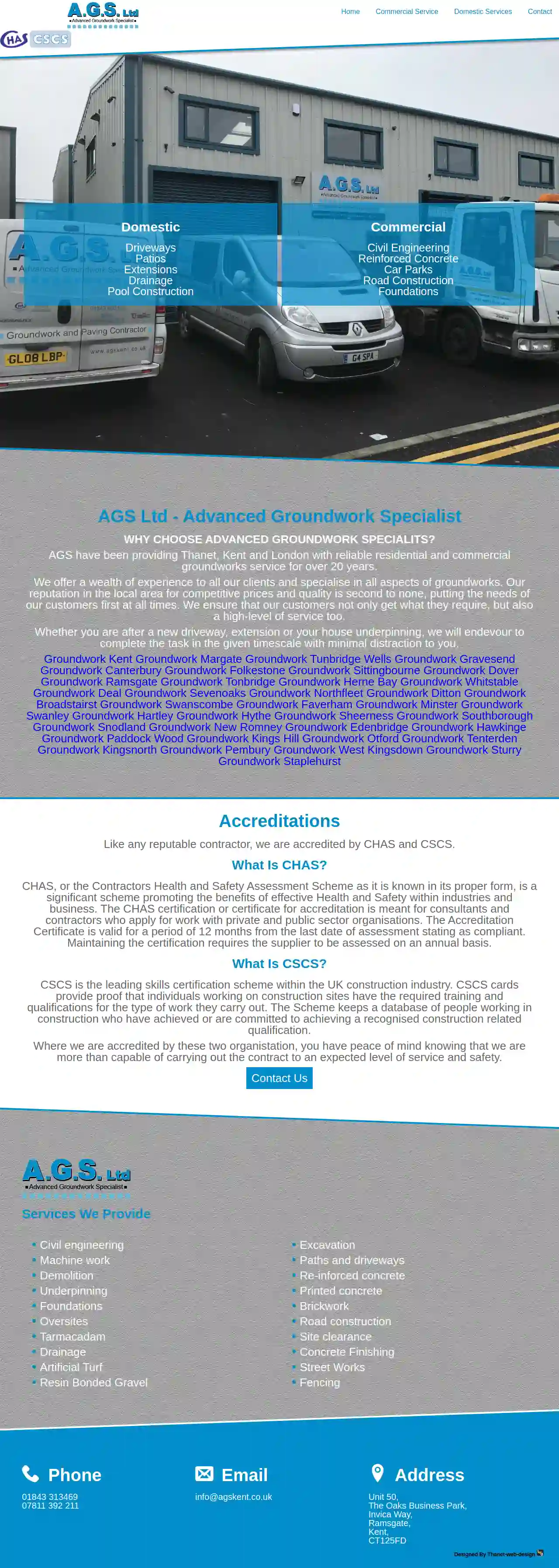
Advanced Groundwork Specialist
Unit 50, The Oaks Business Park, Invica Way, Ramsgate, Kent, CT125FD, GBAGS Ltd - Advanced Groundwork Specialist AGS have been providing Thanet, Kent and London with reliable residential and commercial groundworks service for over 20 years. We offer a wealth of experience to all our clients and specialise in all aspects of groundworks. Our reputation in the local area for competitive prices and quality is second to none, putting the needs of our customers first at all times. We ensure that our customers not only get what they require, but also a high-level of service too. Whether you are after a new driveway, extension or your house underpinning, we will endeavour to complete the task in the given timescale with minimal distraction to you. Accreditations Like any reputable contractor, we are accredited by CHAS and CSCS. What Is CHAS? CHAS, or the Contractors Health and Safety Assessment Scheme as it is known in its proper form, is a significant scheme promoting the benefits of effective Health and Safety within industries and business. The CHAS certification or certificate for accreditation is meant for consultants and contractors who apply for work with private and public sector organisations. The Accreditation Certificate is valid for a period of 12 months from the last date of assessment stating as compliant. Maintaining the certification requires the supplier to be assessed on an annual basis. What Is CSCS? CSCS is the leading skills certification scheme within the UK construction industry. CSCS cards provide proof that individuals working on construction sites have the required training and qualifications for the type of work they carry out. The Scheme keeps a database of people working in construction who have achieved or are committed to achieving a recognised construction related qualification. Where we are accredited by these two organisations, you have peace of mind knowing that we are more than capable of carrying out the contract to an expected level of service and safety.
- Services
- Why Us?
- Accreditations
- Gallery
Get Quote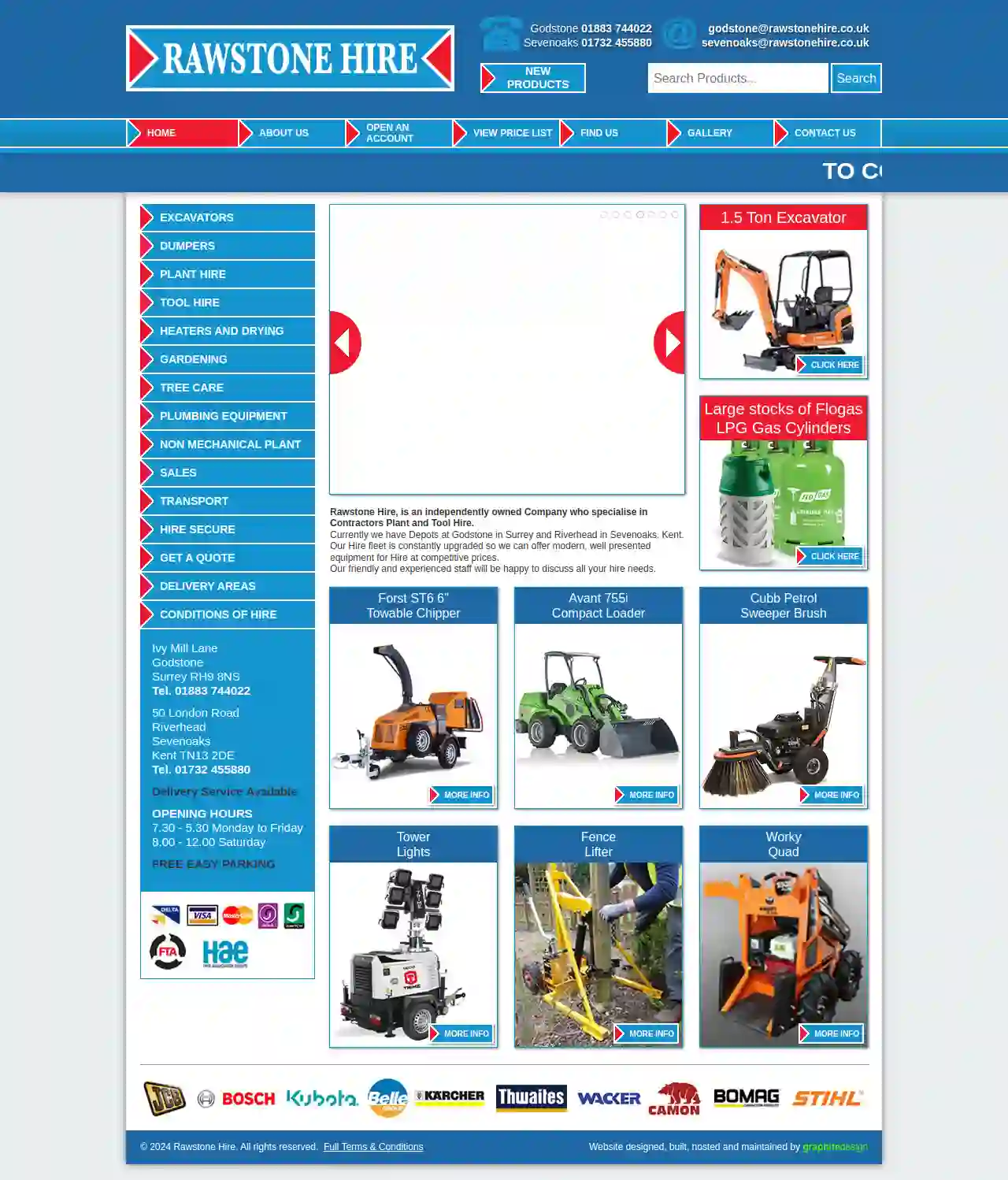
Rawstone Hire
433 reviewsIvy Mill Lane, GodstoneSurrey, Ivy Mill LaneGodstoneSurrey, Godstone, RH9 8NS, GBRawstone Hire: Your Trusted Partner for Plant and Tool Hire Rawstone Hire is an independently owned company specializing in providing contractors with top-quality plant and tool hire solutions. We have depots strategically located in Godstone, Surrey, and Riverhead, Sevenoaks, Kent, ensuring convenient access to our extensive hire fleet. Our commitment to excellence is reflected in our constantly upgraded equipment, offering modern, well-presented tools and machinery at competitive prices. At Rawstone Hire, we understand the importance of reliable and efficient equipment for your projects. Our friendly and experienced team is dedicated to providing personalized service and expert advice to meet your specific hire needs. Whether you require excavators, dumpers, or a wide range of tools, we have the right equipment to support your success. We take pride in offering a comprehensive range of services, including: Plant Hire Tool Hire Heaters and Drying Equipment Gardening Equipment Tree Care Equipment Plumbing Equipment Non-Mechanical Plant Sales Transport Hire Secure Our commitment to customer satisfaction is evident in our dedication to providing a seamless experience. We offer convenient delivery services and flexible hire options to suit your project requirements. Contact us today to discuss your hire needs and let us help you achieve your project goals.
- Services
- Why Us?
- Gallery
Get Quote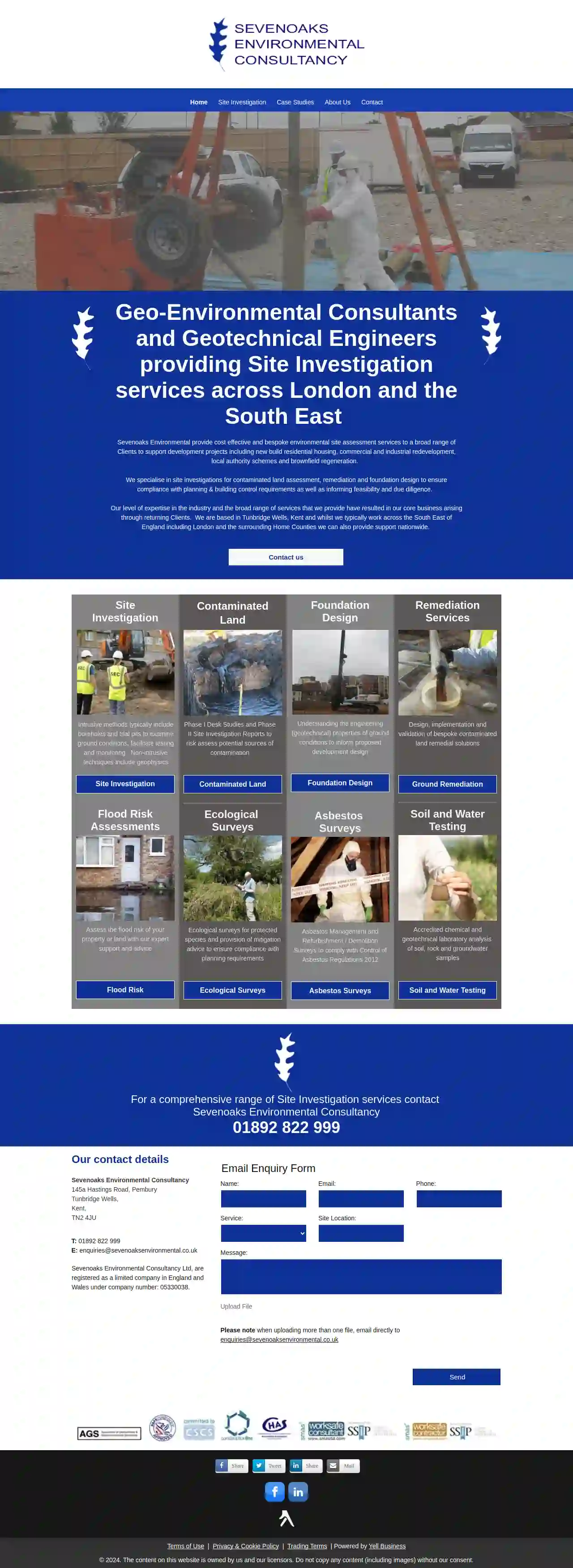
Sevenoaks Environmental Consultancy Ltd
3.73 reviews145a Hastings Road, PemburyTunbridge Wells, Kent, Tunbridge Wells, TN2 4JU, GBGeo-Environmental Consultants and Geotechnical Engineers providing Site Investigation services across London and the South East Sevenoaks Environmental provide cost effective and bespoke environmental site assessment services to a broad range of Clients to support development projects including new build residential housing, commercial and industrial redevelopment, local authority schemes and brownfield regeneration. We specialise in site investigations for contaminated land assessment, remediation and foundation design to ensure compliance with planning & building control requirements as well as informing feasibility and due diligence. Our level of expertise in the industry and the broad range of services that we provide have resulted in our core business arising through returning Clients. We are based in Tunbridge Wells, Kent and whilst we typically work across the South East of England including London and the surrounding Home Counties we can also provide support nationwide. About Us Sevenoaks Environmental Consultancy was founded in 2002 by Damian Jones and we have been providing Geo-Environmental and Geotechnical Site Investigation services since. We have grown over the years to accommodate the increase in demand for these services and our team of experienced engineers and consultants provide advice and environmental solutions to a broad range of clients including Design and Build Contractors, Architects, Structural Engineers, Property Developers, Commercial companies and Local Authorities across the South East of the UK. Our core business revolves around contaminated land assessment to support planning, due diligence, project feasibility and development design. We also offer a number of other associated multi-disciplinary services that are often required in relation to development projects to help afford our Clients with continuity, cost efficiency and a one stop shop for their environmental assessment requirements. To discuss your project, please contact our team.
- Services
- Why Us?
- Gallery
Get Quote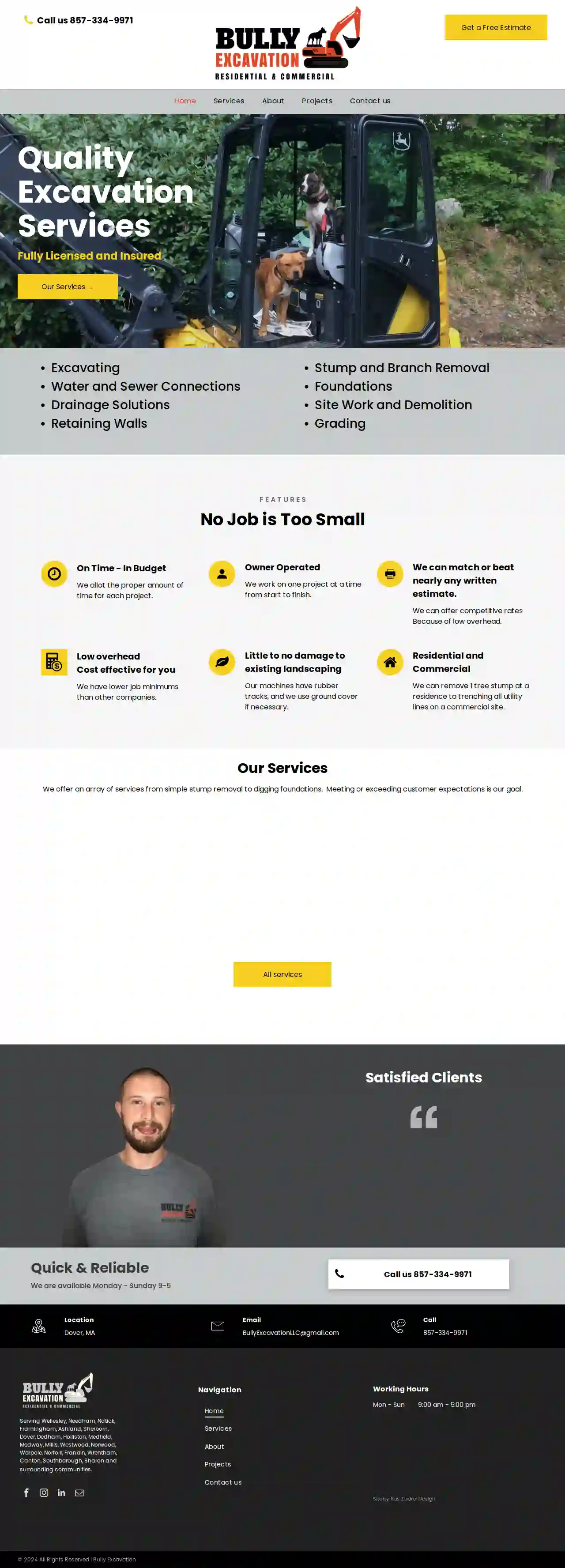
Bully excavation
Dover, MA, GBAbout Bully Excavation David Van Tassell, the founder and operator of Bully Excavation, has always had a passion for all things mechanical. Growing up, he spent countless hours working on cars and in his grandfather's wood shop. As a teenager, he often tackled his own car repairs. Dave graduated from Northeastern University in 2007 with a Bachelor's degree in Mechanical Engineering. After working as an engineer for Pratt and Whitney, he went on to work at a small start-up company in South Boston. Dave's entrepreneurial spirit and strong work ethic have made Bully Excavation a successful company. Our Mission At Bully Excavation, our mission is to provide our clients with high-quality excavation services, cost-effective construction, and clear communication. We strive to build lasting relationships with our customers by consistently exceeding their expectations. Need help with an outdoor project? Don't hesitate to reach out to us! We're here to help you get started.
- Services
- Why Us?
- Our Team
- Testimonials
- Gallery
Get Quote
Secret Wartime Tunnels
4.6909 reviewsDover, GBEnglish Heritage: Exploring England's Rich History English Heritage is a charity dedicated to preserving and sharing England's rich history and heritage. We care for over 400 historic places, from ancient monuments to grand castles, offering visitors a glimpse into the past and a chance to connect with England's fascinating story. Our mission is to inspire people to explore, understand and care for England's past. We achieve this through a variety of initiatives, including: Providing access to our historic places for visitors to enjoy and learn from. Carrying out conservation and restoration work to protect our heritage for future generations. Developing educational programs and resources to engage people of all ages in history. Working with communities to ensure that our heritage is valued and celebrated. We believe that everyone should have the opportunity to experience and learn from England's history. We offer a range of programs and services to make our historic places accessible to all, including: Family-friendly events and activities Accessible facilities for visitors with disabilities Educational resources for schools and community groups Volunteer opportunities for those who want to get involved in preserving our heritage We are committed to being a responsible and sustainable organization. We are working to reduce our environmental impact and to ensure that our historic places are managed in a way that benefits both people and the environment. Join us on a journey through time and discover the wonders of England's past.
- Services
- Why Us?
- Gallery
Get Quote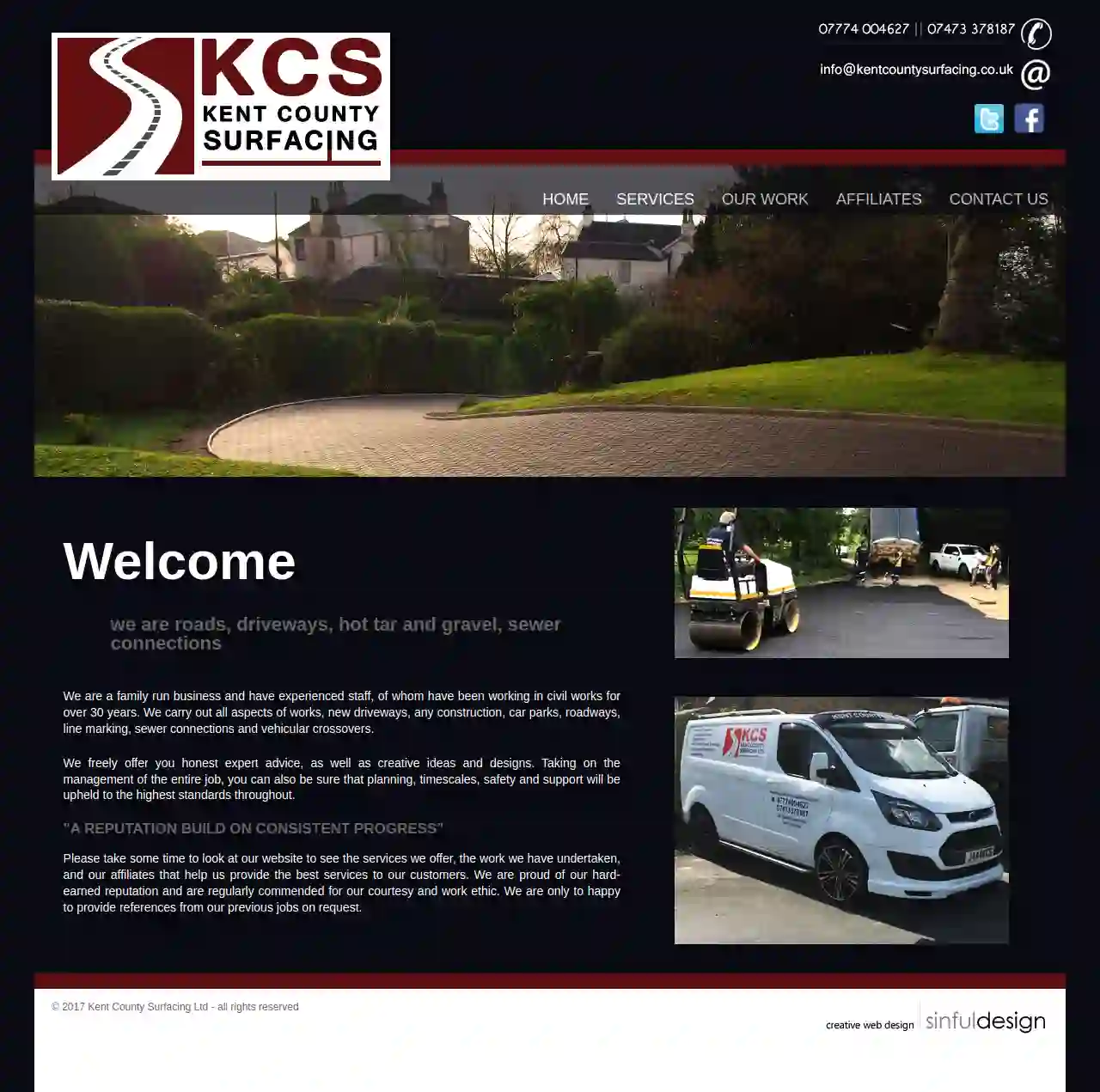
Oatmor Harris Excavations Ltd
Deal, GBKent County Surfacing: Your Trusted Partner for Roads, Driveways, and More Kent County Surfacing is a family-run business with a rich history spanning over 30 years. Our experienced team specializes in all aspects of civil works, from new driveways and construction projects to car parks, roadways, and sewer connections. We are committed to providing our clients with honest expert advice, creative designs, and meticulous project management. We take pride in upholding the highest standards of planning, safety, and support throughout every project. We are proud of our hard-earned reputation for consistent progress, courtesy, and work ethic. We are regularly commended for our dedication to customer satisfaction. We are happy to provide references from our previous projects upon request. Explore our website to learn more about our services, view examples of our work, and discover our trusted affiliates who help us deliver exceptional results.
- Services
- Why Us?
- Gallery
Get Quote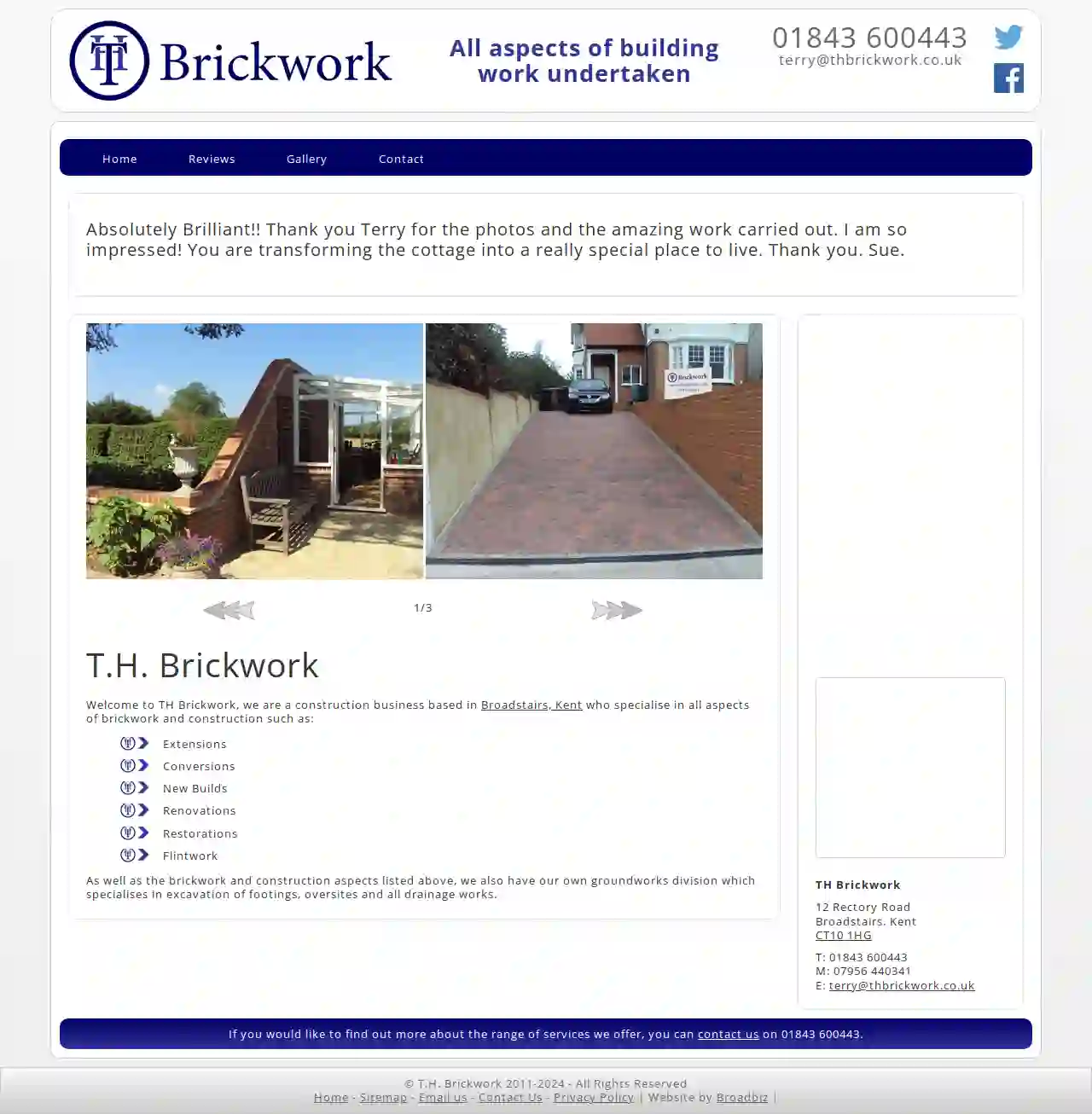
TH Brickwork
53 reviews12 Rectory Road, Broadstairs, CT10 1HG, GBWelcome to TH Brickwork We are a construction business based in Broadstairs, Kent who specialise in all aspects of brickwork and construction such as: Extensions Conversions New Builds Renovations Restorations Flintwork As well as the brickwork and construction aspects listed above, we also have our own groundworks division which specialises in excavation of footings, oversites and all drainage works.
- Services
- Why Us?
- Testimonials
- Gallery
Get Quote
Balcat ltd
52 reviewsWhitstable, GBAbout Balcat Ltd. At Balcat Ltd., we offer a comprehensive service for all your residential building needs, starting with your initial idea and any architectural requirements you may have, through to all the building work and finishing touches. We specialize in extensions, renovations, loft conversions, and new builds, as well as bespoke work. Our Expertise Carpentry is at the heart of Balcat Ltd., and with 19 years of experience in the industry, our craftsmanship is exceptional. Our attention to detail and the quality of our finish are second to none. We strive to complete each project within the agreed timeframe and would be delighted to discuss any project you have in mind. Our Commitment Balcat Ltd. is based in Blean, Kent. We are a carpentry and construction contractor. We firmly believe that life is measured by achievement, not just by years alone. We strive for perfection on every project we undertake.
- Services
- Why Us?
- Gallery
Get Quote
LandWorks Excavation
57 reviewsDover, GBLooking for an experienced professional to tackle a project? Get guaranteed quality results with LandWorks Excavation. We offer tailored solutions and reliable services for a wide variety of needs, working with the dedication and craftsmanship that has earned us a reputation for excellence. Get in touch for a free quote today.
- Services
- Why Us?
- Testimonials
- Gallery
Get Quote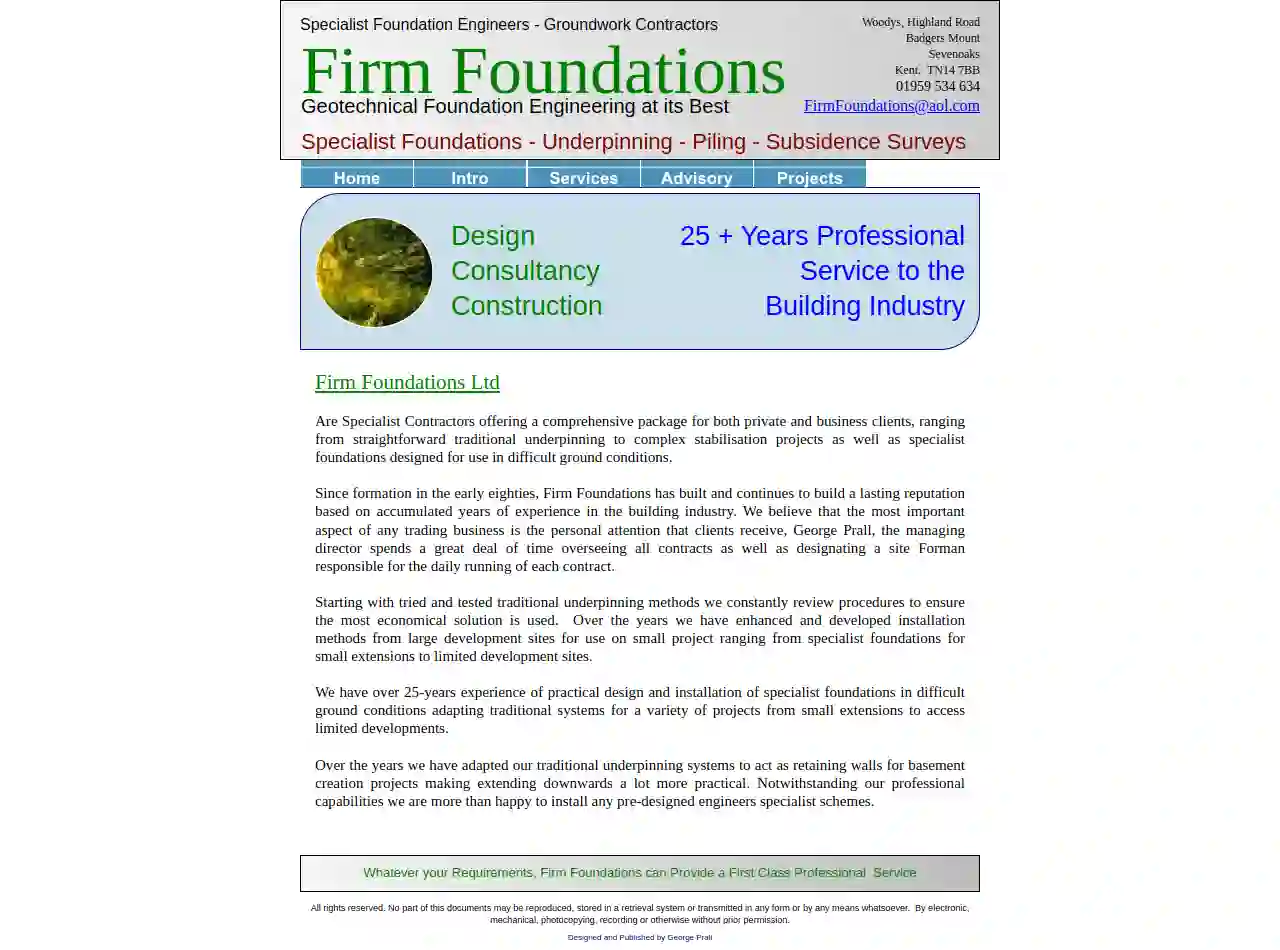
Firm Foundations
51 reviewsWoodys, Highland Road, Badgers Mount, TN14 7BB, GBFirm Foundations Ltd Are Specialist Contractors offering a comprehensive package for both private and business clients, ranging from straightforward traditional underpinning to complex stabilisation projects as well as specialist foundations designed for use in difficult ground conditions. Since formation in the early eighties, Firm Foundations has built and continues to build a lasting reputation based on accumulated years of experience in the building industry. We believe that the most important aspect of any trading business is the personal attention that clients receive, George Prall, the managing director spends a great deal of time overseeing all contracts as well as designating a site Forman responsible for the daily running of each contract. Starting with tried and tested traditional underpinning methods we constantly review procedures to ensure the most economical solution is used. Over the years we have enhanced and developed installation methods from large development sites for use on small project ranging from specialist foundations for small extensions to limited development sites. We have over 25-years experience of practical design and installation of specialist foundations in difficult ground conditions adapting traditional systems for a variety of projects from small extensions to access limited developments. Over the years we have adapted our traditional underpinning systems to act as retaining walls for basement creation projects making extending downwards a lot more practical. Notwithstanding our professional capabilities we are more than happy to install any pre-designed engineers specialist schemes. Whatever your Requirements, Firm Foundations can Provide a First Class Professional Service 25 + Years Professional Service to the Building Industry
- Services
- Why Us?
- Gallery
Get Quote
Over 13,059+ Excavation Contractors registered
Our excavation contractors operate in Edenbridge and beyond!
ExcavationHQ has curated and vetted Top Excavation Businesses near Edenbridge. Find a reliable business today.
Frequently Asked Questions About Excavation Contractors
- Trench Collapses: Unstable trench walls can cave in, posing a severe risk to workers. Proper shoring and sloping are crucial safety measures.
- Utility Damage: Striking underground utilities (gas, water, electric) can cause leaks, explosions, or electrocution. Accurate utility locates and careful digging are essential.
- Falling Objects: Materials or equipment falling into excavations can injure workers. Securing work areas and using appropriate safety gear is vital.
- Equipment Accidents: Operating heavy machinery involves risks of rollovers, collisions, or mechanical failures. Trained operators and proper equipment maintenance are critical.
- Environmental Hazards: Excavated soil might contain hazardous materials (asbestos, lead). Proper testing and disposal procedures are necessary.
- Soil Type and Stability: Stable, cohesive soils allow for deeper excavations than loose or unstable soils.
- Groundwater Level: Excavations below the water table require dewatering techniques to manage water intrusion.
- Equipment and Resources: The size and capabilities of excavation equipment influence the achievable depth.
- Safety Regulations: OSHA and other safety regulations impose limitations on trench depths without proper shoring or sloping.
- Project Requirements: The purpose of the excavation (basement, pool, foundation) determines the necessary depth.
- Clearly Define the Scope: Outline the project's goals, including the excavation area, depth, grade, and intended use.
- Obtain Necessary Permits: Research and acquire any required permits from your local authorities.
- Mark Utility Lines: Contact your utility companies to locate and mark underground utilities to prevent damage.
- Communicate with Neighbors: Inform your neighbors about the project's timeline and potential noise or disruptions.
- Prepare the Site: Clear any obstacles, such as vegetation, furniture, or structures, from the excavation area.
- Discuss Safety Protocols: Review safety procedures with the contractor to ensure a safe work environment.
- Experience: Choose contractors with a proven track record and years of experience in excavation projects similar to yours.
- Licensing and Insurance: Verify that they are properly licensed to operate in your area and carry adequate insurance to protect you from liability in case of accidents or damage.
- Equipment and Resources: Ensure they have the necessary equipment and resources to handle your project efficiently and safely.
- Positive Reviews and References: Check online reviews and testimonials from previous customers. Request references and contact them to inquire about their experience with the contractor.
- Professionalism: Opt for a company that communicates clearly, provides detailed and transparent estimates, and has a responsive and courteous team.
What are the risks associated with excavation?
How deep can you excavate?
What should I do before excavation starts?
How do I find a good excavation contractor?
What are the risks associated with excavation?
- Trench Collapses: Unstable trench walls can cave in, posing a severe risk to workers. Proper shoring and sloping are crucial safety measures.
- Utility Damage: Striking underground utilities (gas, water, electric) can cause leaks, explosions, or electrocution. Accurate utility locates and careful digging are essential.
- Falling Objects: Materials or equipment falling into excavations can injure workers. Securing work areas and using appropriate safety gear is vital.
- Equipment Accidents: Operating heavy machinery involves risks of rollovers, collisions, or mechanical failures. Trained operators and proper equipment maintenance are critical.
- Environmental Hazards: Excavated soil might contain hazardous materials (asbestos, lead). Proper testing and disposal procedures are necessary.
How deep can you excavate?
- Soil Type and Stability: Stable, cohesive soils allow for deeper excavations than loose or unstable soils.
- Groundwater Level: Excavations below the water table require dewatering techniques to manage water intrusion.
- Equipment and Resources: The size and capabilities of excavation equipment influence the achievable depth.
- Safety Regulations: OSHA and other safety regulations impose limitations on trench depths without proper shoring or sloping.
- Project Requirements: The purpose of the excavation (basement, pool, foundation) determines the necessary depth.
What should I do before excavation starts?
- Clearly Define the Scope: Outline the project's goals, including the excavation area, depth, grade, and intended use.
- Obtain Necessary Permits: Research and acquire any required permits from your local authorities.
- Mark Utility Lines: Contact your utility companies to locate and mark underground utilities to prevent damage.
- Communicate with Neighbors: Inform your neighbors about the project's timeline and potential noise or disruptions.
- Prepare the Site: Clear any obstacles, such as vegetation, furniture, or structures, from the excavation area.
- Discuss Safety Protocols: Review safety procedures with the contractor to ensure a safe work environment.
How do I find a good excavation contractor?
- Experience: Choose contractors with a proven track record and years of experience in excavation projects similar to yours.
- Licensing and Insurance: Verify that they are properly licensed to operate in your area and carry adequate insurance to protect you from liability in case of accidents or damage.
- Equipment and Resources: Ensure they have the necessary equipment and resources to handle your project efficiently and safely.
- Positive Reviews and References: Check online reviews and testimonials from previous customers. Request references and contact them to inquire about their experience with the contractor.
- Professionalism: Opt for a company that communicates clearly, provides detailed and transparent estimates, and has a responsive and courteous team.